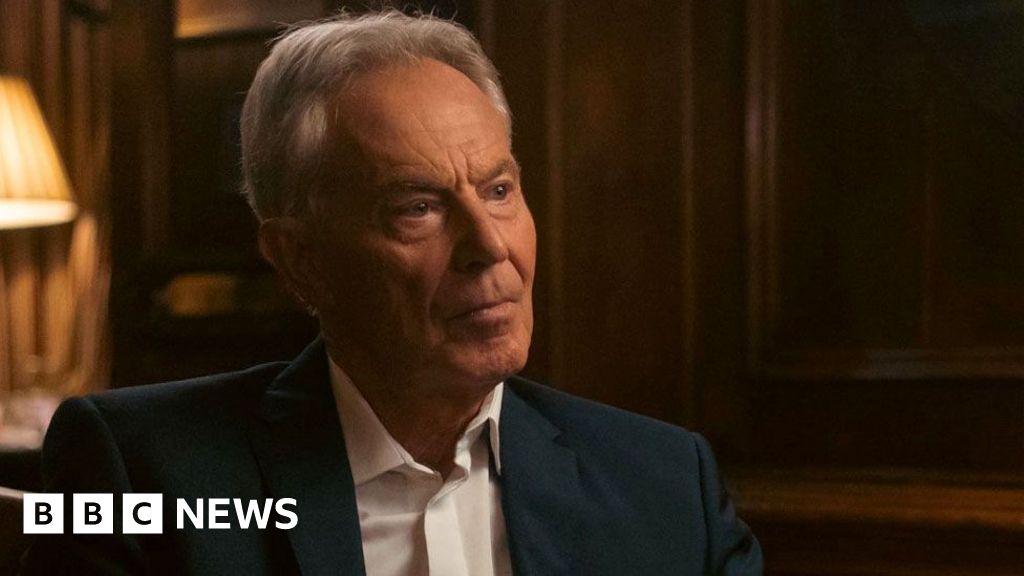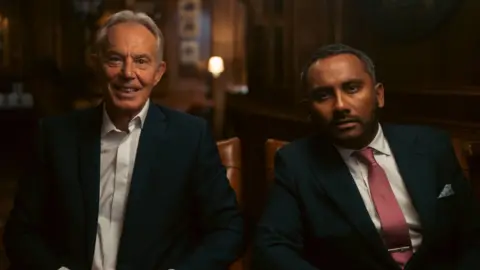 BBC
BBCSir Tony Blair has been out of power in government for 17 years.
Yet he thinks he’s learned almost as much after leaving Number 10 as when he was in it.
One of the key insights from the revolutions in behavioural economics and neuroscience of the past 20 years is the degree to which our biases and experience frame our understanding of fresh information.
Even when we don’t want to, we make sense of the new by reference to the old.
It is inevitable, then, that the recent election of a Labour prime minister after more than a decade of Tory rule has occasioned endless comparison with the last time that happened, in 1997.
Both Sir Keir Starmer and Sir Tony are lawyers by training.
Both have cast themselves against the Left of the Labour Party.
But the similarities pretty much end there.
“The zeitgeist today is different,” Mr Blair says.
New Labour was approaching not just the turn of the century, but of the millennium, and the mood in the country was “pretty optimistic”.
And today?
“More anxious.”
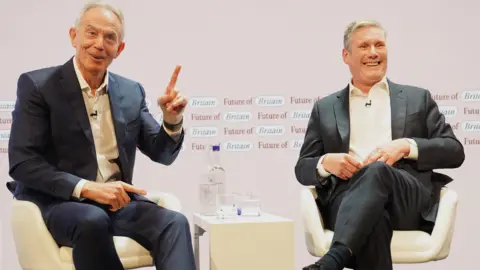 PA
PABritain is not, as Sir John Major, Mr Blair’s predecessor, wanted, a nation at ease with itself.
In particular, our recent economic history is, like that of many other Western democracies, a tale of shocks and stagnation: a “vicious cycle of increased costs, increased taxes, and poor outcomes”.
Aside from the UK being very different under each of their tenures, Sir Tony and Sir Keir have very different political antennae and life experiences.
Mr Blair, while concerned about inequality and the plight of the poor, wrote in his memoir, A Journey, that he identified more with the aspirations of the middle class than the anxieties of the working class.
He said he wanted to move Labour beyond class struggle.
Sir Keir has said his “project” is “to return Labour to the service of working people, to become once again the natural vehicle for their hopes and aspirations.”
Technology revolution
But I am told that the question “What would Tony do?” is often heard, explicitly or implicitly, within the new government, just as those who ran the coalition government referred to him, with tongue only loosely in cheek, as the Master.
Luckily for all concerned, he has written down some answers in a new book, called On Leadership.
It has two central arguments.
First, the quality of governance and leadership is the difference between success and failure for countries.
Effective leadership requires stability and decisions for the long term.
When Mr Blair stood down, Britain had been led by just three people over 28 years.
Now we’re on our sixth prime minister in eight years.
The second, which is not new coming from Sir Tony, is that we are living through a technology revolution greater in consequence than previous industrial revolutions.
Primarily, this concerns Artificial Intelligence (AI).
The former prime minister is of the school that AI will change everything everywhere.
He’s all in.
And his argument, which forms a key plank of his institute’s work, is “the big question for any political leader in modern politics is how do I understand, master and harness the technology revolution?”
Disagreement over ID cards
He is sometimes criticised for talking in generalities or abstractions about technology rather than specifics, but this overlooks the many detailed policy recommendations his Tony Blair Institute for Global Change has made.
This think tank works in over 40 countries, advising governments, they say, on policy, delivery and strategy.
Prime among them: a digital ID, kept in a personalised digital wallet for each person to control who it is shared with.
In power, Mr Blair spent a lot of capital on ID cards, and lost the argument.
Today, although Labour has ruled out Digital ID, figures such as former chancellor George Osborne have changed their mind, accepting Sir Tony’s point that given how much data we hand over to tech companies, and the potential gains in running services and controlling migration, the idea should be revisited.
Technology allows Sir Tony to channel the optimism that he exuded after winning the Labour leadership.
There has never been a more exciting time to be in politics, he argues, such is the potential of this technology revolution.
But there is no getting away from the sheer scale of the challenges.
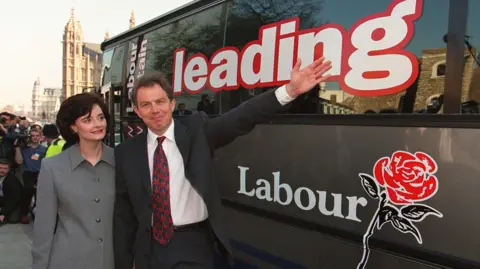 PA
PAI ask him how he would describe Britain’s standing in the world compared with 20 years ago.
Initially at least he is, as it were, diplomatic.
His foreign policy, he says, had three pillars.
First, he believed Britain should be “America’s strongest ally”, and second, that we should be “key players in Europe”.
The third pillar was that we should exert soft power globally through a Department for International Development.
“And the truth of the matter is”, he says, “where we are on all three now?”
I ask him if what he’s really saying is, Britain is smaller and less influential in a more dangerous world.
“Yes,” he says, “but it’s a consequence of decisions that we’ve taken”.
Brexit is just one of those. “We’re going to have to rebuild our defence capabilities,” he says, costly though that may be.
Identity and belonging
As you will see in the interview, we had a strident exchange on globalisation.
I put to him an argument that Gordon Brown has made: that globalisation created a lot of losers, and that perhaps his government wasn’t sufficiently ready for, or sensitive to, that.
And that national populism, which is surging across much of the world, is in part a reaction to that.
He resists.
An unrepentant globalist, Mr Blair insists that “the world is not going to slow down”, and that you have to re-skill and equip people for a world that is doing the opposite.
Asked why politics in many Western democracies has shifted toward socio-cultural issues of identity and belonging, potentially more uncomfortable terrain for those on the left than socio-economic policy, he says: “Where people feel the world is changing in a way in which they don’t have a lot of control, then they cling to their identity.”
And on whether the failure to find weapons of mass destruction in Iraq also eroded public trust in democracy, Mr Blair argues that none of the public inquiries into the Iraq War ever found deception.
The mistake, he continues to insist, was failure to sufficiently understand the terrain Britain and America were entering.
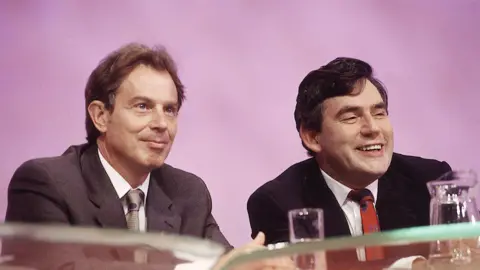
To spend time in the Blair universe is to come across familiar patterns of thought.
He often describes people he rates highly as “capable”; uses the phrase “I always say to people” constantly; says of laudable figures that such and such person “was and is” admirable; and leans on tropes such as, you can look at politics in terms of right and left, or in terms of right and wrong.
But the biggest surprise in his new book is the constant Biblical references, and in particular, Moses.
In his 2010 memoir, Sir Tony said he always had a passion greater than politics, which is religion.
That can be keenly felt now.
When, in preparation for this interview, I spoke to over a dozen people who know him well, including former prime ministers, the word they most frequently attached to him was “messianic”.
At 71, he retains that zeal. Whether for good or for ill you can decide; but his continued influence around the world, and in 10 Downing Street, is not in doubt.
Amol Rajan Interviews: Tony Blair is on BBC iPlayer. A longer version can be found on BBC Sounds.

